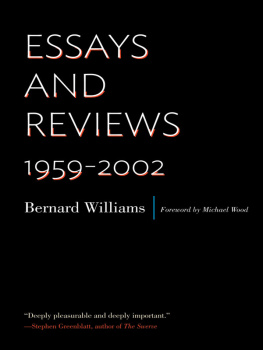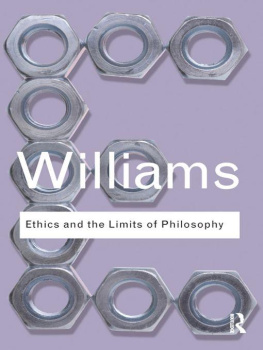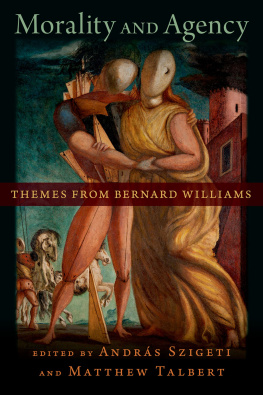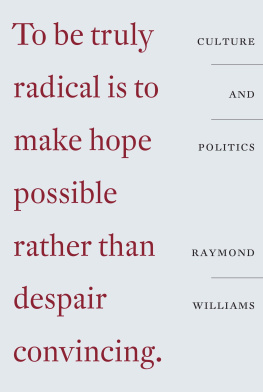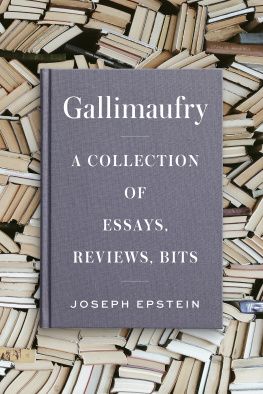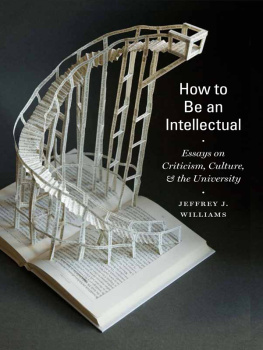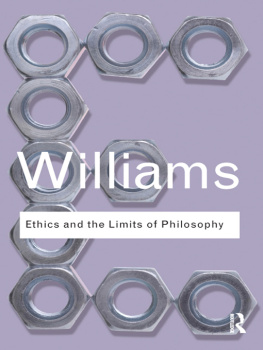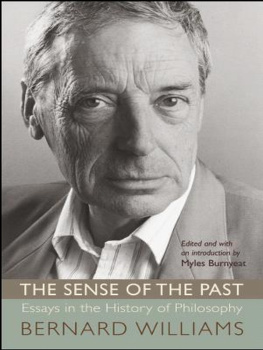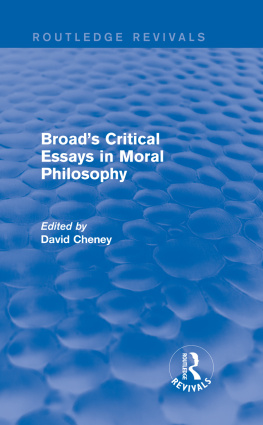
Essays and Reviews
A Selection of Books by Bernard Williams
Morality: An Introduction to Ethics
Utilitarianism: For and Against (with J.J.C. Smart)
Descartes: The Project of Pure Enquiry
Moral Luck
Ethics and the Limits of Philosophy
Shame and Necessity
Plato: The Invention of Philosophy
Truth and Truthfulness: An Essay in Genealogy
Collections of Essays Published Posthumously
On Opera
In the Beginning Was the Deed: Realism and Moralism in Political Argument
The Sense of the Past: Essays in the History of Philosophy
Essays and Reviews
19592002
Bernard Williams
Foreword by Michael Wood
PRINCETON UNIVERSITY PRESS
Princeton and Oxford
Copyright 2014 by Princeton University Press
Published by Princeton University Press, 41 William Street, Princeton, New Jersey 08540
In the United Kingdom: Princeton University Press, 6 Oxford Street, Woodstock, Oxfordshire OX20 1TW
press.princeton.edu
All Rights Reserved
LIBRARY OF CONGRESS CATALOGING-IN-PUBLICATION DATA
Williams, Bernard, 1929-2003.
Essays and reviews, 1959-2002 / Bernard Williams ; foreword by Michael Wood.
pages cm
Includes bibliographical references and index.
ISBN 978-0-691-15985-0 (hardcover : alk. paper)
1. Philosophy, English20th century. 2. Philosophy, British20th century. I. Title.
B1674.W49451 2014
192dc23 2013022385
British Library Cataloging-in-Publication Data is available
This book has been composed in Sabon and Ideal Sans
Printed on acid-free paper
Printed in the United States of America
10 9 8 7 6 5 4 3 2 1
Contents
Foreword
In the first of the reviews reprinted in the present volume, Bernard Williams recalls and dismisses what he trusts is an outdated estimation of Plato, sharply expressing his ironic surprise that anyone should ever have offered or accepted it. Far from seeing the Republic as one of the noblest monuments of Western liberalism and enlightenment, Williams finds in it only an extraordinary tissue of historical falsehood and philosophical misunderstanding, and support for a political system based on oligarchic deceit and a contempt for much legitimate aspiration and human diversity. Plato represents as a system of consent what must actually be, on his own premises, a system of coercion. This is fine, fiery writing and leaves us in no doubt about Williamss own political and moral position. Or about his interest in the chances and importance of independence of mind. The same review includes a characteristic use and definition of the word provocative. The book under consideration, a reissue of Plato Today, by Richard Crossman, a Member of Parliament and distinguished Labour Party intellectual, is said to be provocative in the best senseprovocative of thought.
Williams had a distinguished career as an academic philosopherhe won a prize fellowship at All Souls, Oxford as soon as he had finished his first degree, and was appointed to a chair of philosophy in London at the age of thirty-four. Later he held chairs in Cambridge, Oxford, and Berkeley, and from 1979 to 1987 he was provost of Kings College, Cambridge. He chaired a government Committee on Obscenity and Film Censorship; he commented frequently and lucidly on many public issues, ranging from religion and law to science and abortion and the future of universities. Much of this work is reflected in this volume, but the essays themselves suggest an intellectual scope and a variety that go beyond even these diverse activities, a life of the mind that only an adventurous mind could live.
Although he was not explicitly or exclusively addressing his professional colleagues in the pieces collected here, Williams always wrote as a philosopher in his own ample sense, insisting that philosophy is doing its job wherever curiosity and thinking come together in any serious or cogent way. Such a position allowed him to pay handsome tribute to the disciplines in which he was trained, both classics and philosophy. Analytical philosophy, he said, offers certain virtues of civilized thought: because it gives reasons and sets out arguments in a way that can be explicitly followed and considered; and because it makes questions clearer and sorts out what is muddled. At the same time Williams was concerned that English (and to some extent American) philosophy had become far too pleased with its aloofness from French and German schools of thought, to the point of regarding them not as philosophical traditions at all but as a form of intellectual circus.
While the influence of Hegel radically changed the rest of European thought, and continues to work in it, the sceptical caution of British philosophy left it spectacularly immune to itsplendidly, but to its undoubted loss.
Spectacularly, splendidly. The note of tribute remains, but the charge of complacency could hardly be clearer. There is a point, we may think, where sceptical caution threatens to outlaw curiosity, and even the notion of inquiry. The point was identified long ago by Descartes, and before him by Montaigne, and Williams comments very astutely on the formers philosophical irony, the dry joke that opens the Discourse on Method. Good sense is of all things in the world the most equally distributed, Descartes says, Le bon sens est la chose du monde la mieux partage. We think of ourselves as so abundantly provided with it, that even those most difficult to please in all other matters do not commonly desire more of it than they already possess. This stealthy (and very funny) proposition allows for all kinds of readings, including the contradictory claims that good sense may be indistinguishable from self-congratulation and that even sensible people dont want to be more sensible than they have to be. It certainly implies, in our context, that it is difficult for us to see the good sense of others when it doesnt look like ours.
Williamss style develops in all kinds of ways over the years, but its energy and clarity never fade, and his central concerns, even across a very wide range of topics, are remarkably consistent. The conjunction of history and philosophy in the remarks on Plato is significant too, and the same pairing appears all the way through these essays and reviews, from the early praise of Stuart Hampshires Thought and Action (he regards historical understanding as essential to grasping all but the absolutely basic characteristics of the human mind) right to the very latest entry, entitled Why Philosophy Needs History, an essay closely related to Williamss work for his edition of The Gay Science (2001) and to his final book, Truth and Truthfulness (2002).
Williams cites Nietzsche on the lack of a historical sense as the hereditary defect of philosophers, and goes on to say that the claim, made in 1878, may seem even truer in the first years of the twenty-first century: a lot of philosophy is more blankly non-historical now than it has ever been. However, the point is not that philosophers should become historians of philosophy:
What matters more is their neglect of another historythe history of the concepts which philosophy is trying to understand. The starting point of philosophy is that we do not understand ourselves well enough. We do not understand ourselves well enough ethically (how or why we should be concerned, positively or negatively, with some human dispositions and practices rather than others); we do not fully understand our political ideals; and we do not understand how we come to have ideas and experiences Philosophys methods of helping us to understand ourselves involve reflecting on the concepts we use, the modes in which we think about these various things; and sometimes it proposes better ways of doing this.
Next page
